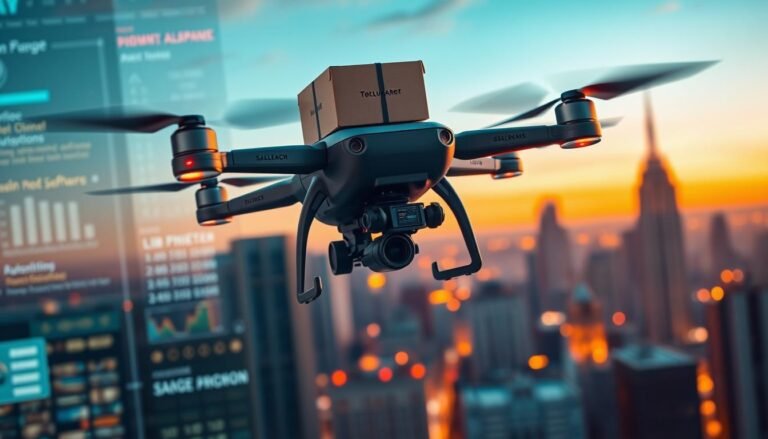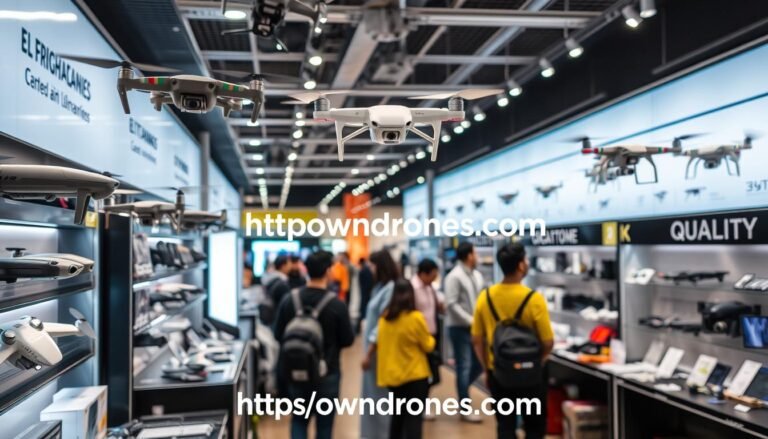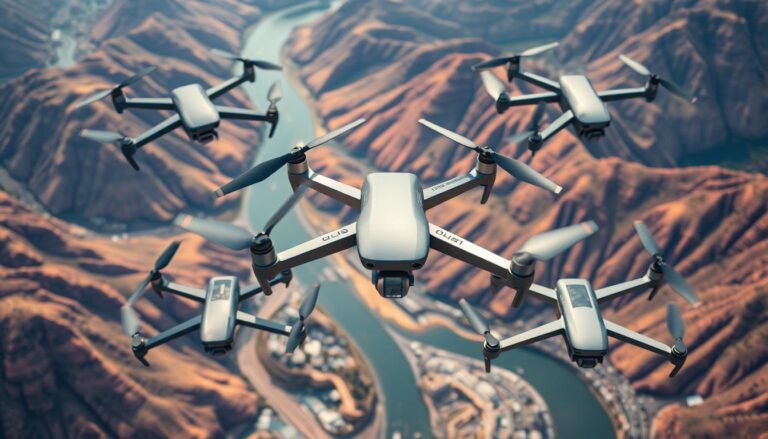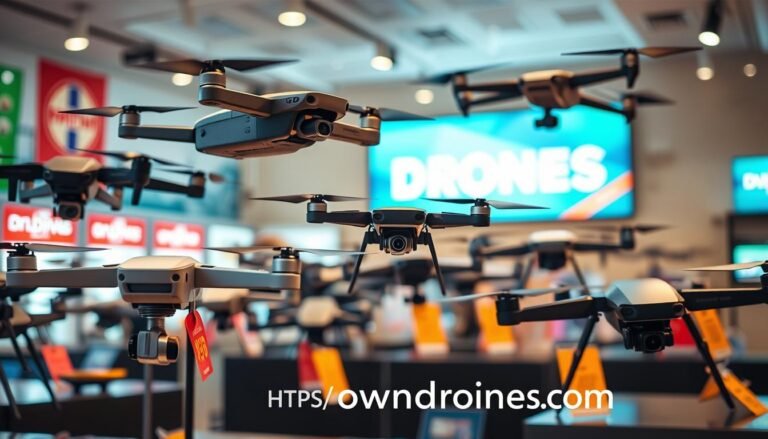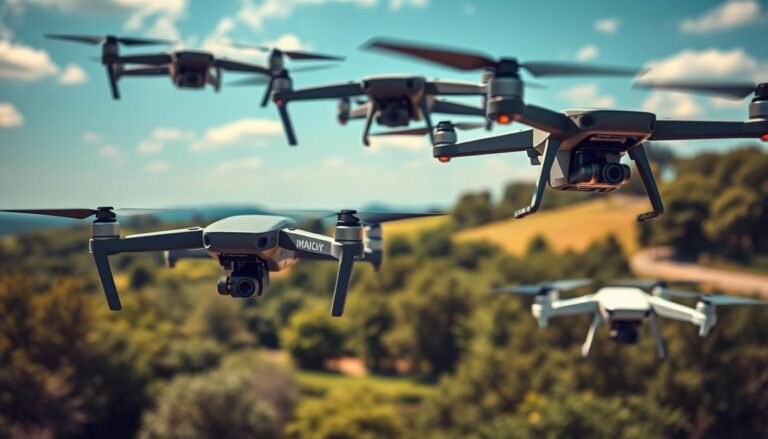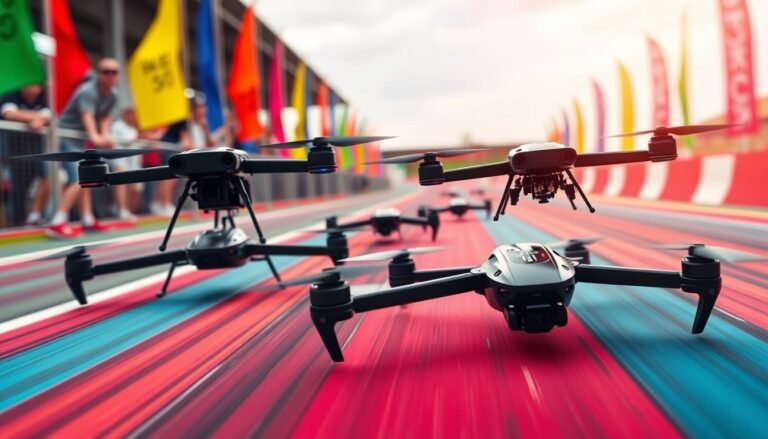Best Drones Beginners: Top Picks for New Pilots
Ready to soar the skies with your own drone? Picking the right starter drone is key. The best beginner drones are easy to fly and budget-friendly. They come packed with features for an exciting start.
This guide covers top beginner drones for various budgets. We’ll look at the DJI Mini 4K, Ryze Tello, and DJI Mini 4 Pro. You’ll also find the best DJI alternative, the Autel Evo Nano+.
We’ve focused on drones under 250g to minimize flight rules. These drones make it easier for you to start flying. Let’s find your perfect entry-level drone!
Key Takeaways
- The DJI Mini 4K is the top choice for most beginner drone pilots, offering an ideal balance of features, ease of use, and affordability.
- Budget-conscious beginners can start with the Ryze Tello, which provides a fun and accessible introduction to drone flying at a lower cost.
- For those willing to invest in a premium beginner drone, the DJI Mini 4 Pro offers advanced features and exceptional performance.
- The Autel Evo Nano+ stands out as the best alternative to DJI drones, with unique features and competitive specs.
- Specialized options like the BetaFPV Cetus X for FPV flight, the HoverAir X1 Pro for aerial selfies, and the DJI Neo for multi-control are available to cater to specific interests.
Introduction to Drones for Beginners
Entering the drone world can feel overwhelming for newcomers. Choosing the right drone is crucial for building confidence and skills. Look for one that’s easy to fly, stable, and has safety features.
What Makes a Great Beginner Drone
The best drones for beginners have intuitive drone controls and beginner-friendly features. Seek models with automatic takeoff and landing, and hover mode for stable flights.
Obstacle avoidance sensors and return-to-home function add extra safety. Durable construction helps withstand crashes as you learn to fly.
- Automatic takeoff and landing
- Hover mode for stable flights
- Obstacle avoidance sensors
- Return-to-home function
- Durable construction to withstand crashes
These drone features ensure a smoother learning curve for new pilots. Drone stability is key for capturing steady footage and maintaining control.
Factors to Consider When Choosing a Starter Drone
When selecting your first drone, keep these factors in mind:
| Factor | Importance |
|---|---|
| Price | Choose a drone that fits your budget while offering essential features for beginners. |
| Camera Quality | Look for a drone with a decent camera if you plan to capture photos and videos. |
| Flight Time | Longer flight times allow for more practice and exploration. |
| Range | Consider the maximum distance the drone can fly from the controller. |
| Obstacle Avoidance | Sensors that detect and avoid obstacles can prevent crashes and damage. |
| Automated Flight Modes | Pre-programmed flight paths and modes can help you capture stunning footage with ease. |
Remember, the best drone for beginners is one that combines ease of use, stability, and safety features to help you build confidence and skills as a new pilot.
DJI Mini 4K: The Best All-Round Drone for Most Beginners
The DJI Mini 4K is a top choice for new drone pilots. It’s compact, lightweight, and folds up for easy transport. Its user-friendly controls and advanced features capture stunning 4K videos and high-quality photos.
Key Features and Benefits
The DJI Mini 4K boasts impressive features for beginners. It has a 12MP sensor for stunning images and 4K video at 30fps.
The drone offers various flight modes and a long transmission range. Its battery lasts up to 31 minutes and charges via USB-C.
Weighing just 246g, it’s ultra-portable. A three-axis gimbal ensures smooth footage, even in windy conditions.
- 12MP 1/2.3-inch CMOS sensor for capturing stunning images
- 4K video resolution at up to 30fps, 2.7K at up to 60fps, and FHD at up to 60fps
- 10km (FCC) or 6km (CE/SRRC/MIC) video transmission range
- Exciting flight modes like Sport, Normal, and QuickShots (Dronie, Helix, Rocket, Circle, and Boomerang)
- 2,250mAh battery capacity for up to 31 minutes of flight time
- USB-C charging and included Battery Charging Hub
- Lightweight design at just 8.68oz (246g)
- Three-axis gimbal for smooth video footage
- Wind resistance up to Level 5 for stable flights
| Feature | Specification |
|---|---|
| Weight | 8.7 oz / 249 g |
| Battery | 2250 mAh Li-ion / up to 31 minutes |
| Video Transmission Range | 6.21 miles / 10 km |
| Video Resolution | 4K, 2.7K, 1080p |
| Frame Rates | 4K 30 FPS / 2.7K up to 60 FPS / 1080p up to 60 FPS |
| Wind Resistance | Level 5 (up to 21 mph) |
| Camera Sensor | 1/2.3-inch 12MP CMOS sensor |
| Maximum Photo Resolution | up to 48MP |
Who Should Buy the DJI Mini 4K
The DJI Mini 4K is perfect for beginners wanting a high-quality, easy-to-fly drone. Its portable design and user-friendly controls make it ideal for novices.
This drone offers excellent value for money. It captures professional-looking photos and videos, making it the best all-round beginner drone.
Ryze Tello: The Best Budget Beginner Drone
The Ryze Tello is perfect for new drone pilots on a budget. This tiny flyer weighs just 80g and measures 98 x 93 x 41mm. It’s great for indoor practice and learning basic flight skills.
Priced at $99 / £99 / AU$169, the Tello offers great value. It flies for up to 13 minutes per charge with a 100m control range. The Boost Combo includes extra batteries and a charger for longer sessions.
The Tello has a 5MP camera for photos and 720p HD video. While video quality is basic, it’s a good start for aerial shots. It features auto take-off, landing, and hover stabilization.
The drone has some limits to consider. Its real Wi-Fi range is 30-40m, and it can reach 10m high. In windy conditions, the light drone may drift.
The Ryze Tello is an excellent choice for beginners looking to enter the world of drones without breaking the bank. Its responsive flight controls, good battery life, and compact design make it a joy to fly indoors and in calm outdoor environments.
The Tello lacks features of pricier drones like the DJI Mini 3 or Mini 2 SE. But it’s unbeatable for tight budgets. Weighing under 250g, you can fly it without registration in most places.
DJI Mini 4 Pro: The Best Premium Beginner Drone
The DJI Mini 4 Pro is perfect for beginners seeking a top-tier drone. It offers advanced features that set it apart from other models. Novice pilots will enjoy an exceptional flying experience with this premium drone.

The Mini 4 Pro boasts an impressive 1/1.3-inch 48-megapixel Quad Bayer image sensor. It captures stunning 4K video at 60 frames per second. You can shoot slow-motion footage at 100 fps or record in 10-bit D-Log M.
The camera rotates 90 degrees, allowing for vertical content creation. This feature is perfect for social media platforms.
Advanced Features for Novice Pilots
The DJI Mini 4 Pro has an advanced obstacle avoidance system. Its full omnidirectional vision sensor array provides extra safety for beginners. This technology prevents collisions and helps you focus on capturing perfect shots.
The Mini 4 Pro offers impressive subject tracking capabilities. This feature keeps your subject in frame while flying. You’ll never miss a moment, whether filming friends or landscapes.
Comparing the DJI Mini 4 Pro to Other Models
The DJI Mini 4 Pro outperforms other beginner drones in features and performance. Here’s a quick comparison of the Mini 4 Pro and some popular alternatives:
| Drone Model | Battery Life | Range | Camera Resolution |
|---|---|---|---|
| DJI Mini 4 Pro | 34 minutes | N/A | 4K @ 60fps, 48MP |
| DJI Neo | 18 minutes | N/A | 4K @ 30fps, 12MP |
| DJI Mini 3 | 38 minutes | 2.48 miles | 4K @ 30fps, 12MP |
| DJI Mini 2 SE | 30 minutes | 2.48 miles | 2.7K, 12MP |
| Autel Evo Nano | 28 minutes | 6.2 miles | 4K, 48MP |
The DJI Mini 4 Pro may cost more than other beginner drones. However, its advanced features and superior performance justify the investment. It’s ideal for those serious about aerial photography and videography.
Autel Evo Nano+: The Best DJI Alternative for Beginners
The Autel Evo Nano+ is a top choice for new drone enthusiasts. It offers great features without the DJI price tag. This compact drone is perfect for aerial photography and videography beginners.
Unique Features of the Autel Evo Nano+
The Evo Nano+ packs impressive features into its small frame. Its large CMOS sensor captures 50MP photos and 4K/30fps videos. The 3-axis gimbal ensures smooth footage, even in tough weather.
Safety is a key feature of the Evo Nano+. Its advanced obstacle avoidance system uses omnidirectional sensors. This helps new pilots avoid crashes while learning to fly.
The drone’s compact size and 28-minute flight time add to its appeal. These features make it an excellent choice for beginners starting their aerial journey.
Pros and Cons of Choosing a Non-DJI Drone
Non-DJI drones like the Evo Nano+ often offer better value. You can get high-end features at a lower price point. This makes them attractive to budget-conscious buyers.
However, DJI’s market dominance has some advantages. They have more accessories, software support, and learning resources. This can be helpful for beginners learning drone piloting.
Your choice depends on what matters most to you. If you want unique features and value, consider the Evo Nano+. For brand reputation and support, a DJI model might be better.
Best Drones Beginners: Additional Options to Consider
The DJI Mini 4K, Ryze Tello, DJI Mini 4 Pro, and Autel Evo Nano+ are great for new pilots. But there are more additional beginner drone options to think about. These drones offer unique benefits for various interests.
The BetaFPV Cetus X is perfect for learning FPV flight. It weighs only 56 grams and has a tough frame. This compact drone flies for up to 6 minutes with a 100-meter range.
For aerial selfies, try the HoverAir X1 Pro. It’s light at 125 grams and flies for 11 minutes. The X1 Pro takes 4000 x 3000 pixel photos with a 30-meter range.
The DJI Neo offers multi-control options for beginners. You can use hand gestures, your smartphone, or a remote controller. It flies for 28 minutes and weighs 249 grams.
| Drone Model | Weight | Flight Time | Range | Camera Resolution |
|---|---|---|---|---|
| BetaFPV Cetus X | 56g | 6 minutes | 100m | N/A |
| HoverAir X1 Pro | 125g | 11 minutes | 30m | 4000 x 3000 pixels |
| DJI Neo | 249g | 28 minutes | 4.3 miles | 8192 x 6144 pixels |
These additional beginner drone options offer something for everyone. You’ll find the right drone for your interests and skill level as a new pilot.
Learning to Fly: Tips and Resources for Beginner Drone Pilots
New drone pilots must learn to fly safely and responsibly. With the right resources, you can quickly develop essential skills. Here are some tips to help you get started.
Essential Safety Guidelines for New Pilots
Before flying, understand and follow key safety guidelines:
- Always maintain a visual line of sight with your drone
- Fly below 400 feet and away from people, vehicles, and structures
- Respect others’ privacy and avoid flying over private property without permission
- Be aware of local laws and regulations that may restrict drone use in certain areas
U.S. recreational drone pilots must follow specific rules. These include registering drones over 0.55 pounds and passing the TRUST test. They must also stick to safety guidelines.
Commercial drone pilots need to comply with the FAA’s Part 107 rules. These rules are more strict than those for recreational pilots.
Online Tutorials and Training Courses
To boost your skills, check out these online resources:
| Resource | Description |
|---|---|
| DJI Tutorials | Official tutorials from DJI covering basic flight operations, camera control, and more |
| UAV Coach | Comprehensive online courses for both recreational and commercial drone pilots |
| Drone U | In-depth video tutorials and resources for drone enthusiasts of all skill levels |
| YouTube Channels | Popular channels like DJI, 51 Drones, and Ready Set Drone offer free tutorials and tips |
Invest time in drone training and make safety your top priority. This will help you become a confident and responsible pilot. Keep checking for updates to rules and best practices as you continue flying.
Drone Accessories for Beginners
The right accessories can vastly improve your drone flying experience. They ensure safe flights and boost your drone’s capabilities. Let’s explore essential items for new pilots.
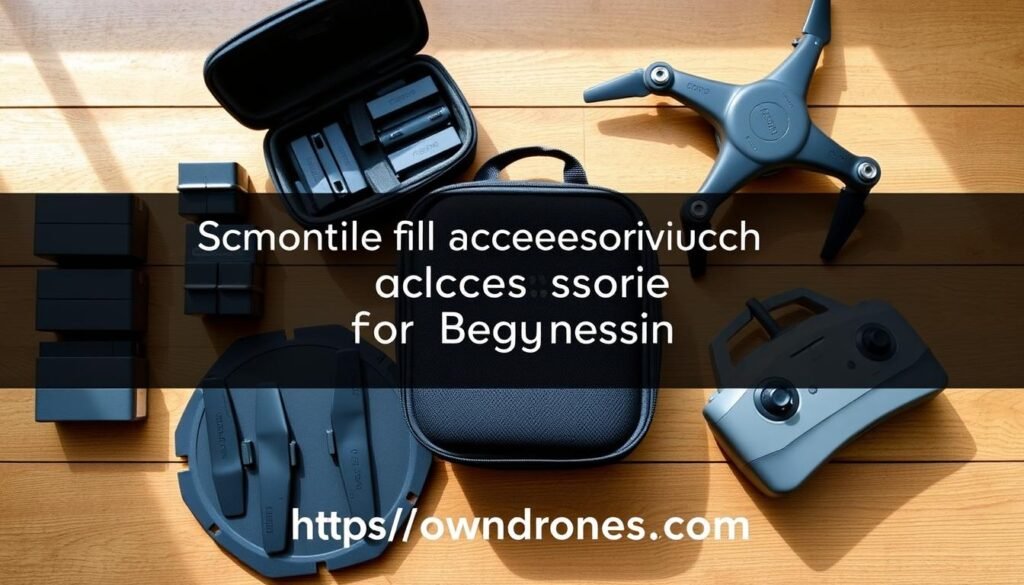
Must-Have Accessories for Your First Drone
New drone pilots should invest in several key accessories. These items will enhance your flying sessions and protect your equipment.
- Extra batteries: Having spare batteries ensures longer flight times and uninterrupted sessions.
- Propeller guards: These protective covers shield your drone’s propellers from damage during collisions or rough landings.
- Carrying case: A dedicated case keeps your drone and accessories organized, protected, and easily transportable.
- Memory cards: High-capacity, high-speed memory cards are crucial for storing high-quality photos and videos.
These essentials will help you get the most from your beginner drone. They also reduce the risk of accidents or damage.
Recommended Upgrades as Your Skills Improve
As you become a more skilled pilot, consider upgrading your equipment. These additions can elevate your drone photography and videography.
| Accessory | Benefit |
|---|---|
| ND filters | Neutral density filters help control light exposure and reduce shutter speed for smoother, more cinematic footage. |
| Advanced remote controller | Upgraded controllers often feature extended range, customizable buttons, and improved ergonomics for a more precise and comfortable flying experience. |
| Spare propellers | Having extra propellers on hand ensures you can quickly replace damaged ones and continue flying without interruption. |
| Landing pad | A portable landing pad provides a clean, stable surface for takeoffs and landings, particularly in dusty or uneven environments. |
These upgrades will boost your aerial imaging capabilities. They’ll also help you refine your piloting skills.
The right drone accessories can make all the difference in your flying experience, whether you’re a beginner or an experienced pilot looking to expand your capabilities.
Drone Regulations and Registration for Beginners
New drone pilots must follow safety rules set by authorities. In the US, the FAA oversees these rules. The EASA handles regulations in the European Union.
US drones weighing 250g or more need FAA registration. This costs $5. Pilots must be 13 to register. Commercial pilots need a Remote Pilot Certificate at 16.
- Drones must weigh less than 55 pounds (25 kg)
- Fly at or below 400 feet in Class G airspace
- Keep the drone within visual line of sight
- Pass the TRUST exam (The Recreational UAS Safety Test)
Commercial pilots follow Part 107 rules. These allow night flights, flying over people, and vehicles without waivers. They must create a FAA DroneZone account and register drones.
| Country | Minimum Age for Registration | Minimum Age for Commercial License |
|---|---|---|
| United States | 13 years old | 16 years old (Part 107) |
| Canada | 14 years old (Basic License) | 16 years old (Advanced License) |
| United Kingdom | 13 years old (Flyer ID) | 18 years old (Operator ID) |
EU drone rules are the same across member states. Pilots must register drones and get licenses based on weight and use. Check your local aviation authority for specific rules.
Stay updated on drone laws through official sources. The FAA’s drone website and EASA’s drone page are helpful. Use the FAA’s B4UFLY app to check airspace rules in your area.
Conclusion: Choosing the Best Drone for Your Needs as a Beginner
Selecting the ideal beginner drone requires careful consideration. Key factors include ease of use, camera quality, flight time, and safety features. Our top picks span various categories to suit different needs and budgets.
Flight time is crucial when picking a beginner drone. Most consumer drones offer 20 to 30 minutes per charge. Advanced models can fly for 40 minutes or more. The Valor F1 drone provides up to 20 minutes of flight time.
Safety features are vital for new pilots. Look for obstacle avoidance systems and Return-to-Home functionality. Beginner modes that limit flight parameters help build confidence and reduce accident risks.
Keep your drone below 400 feet to ensure safe and legal operation. This altitude limit is recommended for new pilots.
Your perfect beginner drone depends on your needs, budget, and intended use. Choose a quality drone that meets your requirements. This will ensure a rewarding experience in drone photography and videography.

